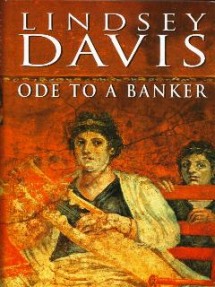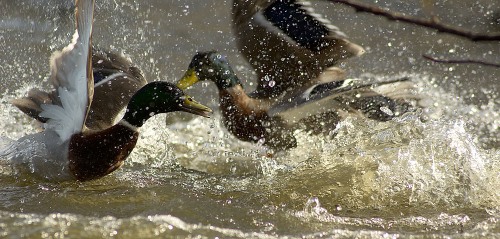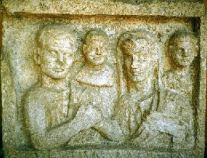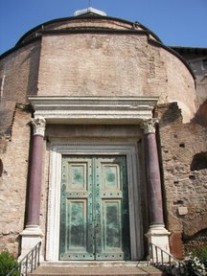
Rome. July – August AD 74. Falco is to give a poetry recital with Rutilus Gallicus, and Caesar Domitain is expected. Aurelius Chrysippus, a wealthy Greek banker and vanity publisher, introduces the event and is found dead the next day. With Rubellus absent, and the vigiles busy, Petro hires Faco to resolve the murder.
Families and backgrounds, past history and present day relationships inform many parts of this narrative, both in Falco’s family and Chrysippus’s family; Chrysippus had divorced and remarried. His first wife still operated their bank with a freedman, one Lucrio.
It is interesting that the banking community of Rome hung about in a dead end alley named after the two-faced god, Janus, for the bankers certainly had a face to the world with their lending practices, and then another face to their clientele with calling in loans and credit.
Falco discovers the tensions in the world of vanity publishing, and is aided admirably by his wife, Helena Justina, who turns out to be a flawless reader who re-educates the reading habits of one Passus, a recently recruited vigile, whom Falco has instructed to notaries all the scrolls found at the murder scene.
We know that Vespasian has recently advanced Falco to Equestrian status, and created the position of Procurator of the Sacred Poultry (as a great joke – there was no income from this procuratorship); he pays his mother’s rent, the schooling for his sister’s children, financial support for his deceased brother’s child, and his sister Maia’s rent. Favonius is grieving the loss of his beloved red-headed scarf-maker. Anacrites is boarding with Falco’s mother, and seeing Maia, and has hopes of becoming part of the family. Falco is not so sure and knows Anacrites as totally untrustworthy. The procurator of the Sacred Geese and Sacred Chickens has to arbitrate a duck-fight within his own family!
- Maia Favonia, his sister, is single and needs an income;
- Elder sister Junia wants to take over the capuona and spreads nasty gossip about Junilla Tacita and Maia;
- Anacrites is giving poor financial advice to Junilla Tacita;
- Helena Justina is unconcerned about Maia’s current beau and knows what is coming;
- Marius is sleeping at Falco’s habiliment and keeping a close eye on his puppy;
- Can Ma be told about the filthy rumours of her having a lover floating around?

Alack, a son can never tell his mother what is what; a mother is entitled to her privacy, and right conduct demands that the son respects that. Falco learns its better not to get involved in a duck-fight. As ducks do, they flap their wings and sail away from each other, fight over. Energy dispersed, Falco is free to take his expert adviser in matters publishing and create a denouement wherein the killer of Aurelius Chrysippus (the banker who is not a very good judge of literary worth) is exposed and perhaps, another killer is free.
The banking community of ancient Rome and their business practices appear to be little different 2000 years later as the money moguls clearly still go their own way with other people’s money.
Family provides a suitable antithesis between Falco and the family of the murdered arts patron, Chrysippus. We take a closer look at these families.
Falco, Family and Business

“[The creditor] examines your family affairs; he meddles with your transactions. If you go forth from your chamber, he drags you along with him and carries you off; if you hide yourself inside he stands before your house and knocks at the door.
If [the debtor] sleeps, he sees the moneylender standing at his head, an evil dream … If a friend knocks a the door he hides under the couch. Does the dog bark? He breaks out in a sweat. The interest due increases like a hare, a wild animal which the ancients believed could not stop reproducing even while it was nourishing the offspring already produced.” Basil of Caesarea
Falco’s family have a lot to say about his work. Geminus is always quick with a joke, and Ma is lately pressuring him to have a decent partner. (Then again, Ma’s idea of a half-decent partner is Anacrites! What Ma doesn’t know about Anacrites would probably fill a sheet of postage stamps). Of course, Petro and Falco never really worked out; Petro the superb vigiles enquiry chief does best with a regular round and routine. An informer’s life (other than that of those on the Septa Julia) is risky – risky for income, risky for decent investigations, and risky with outcomes. You don’t get that with rumours, and certainly not in Nero’s time. We believe Titus and Domitain Casear cleared the Palatine of its bank of informers.
However much advice and criticism he receives from his family, Falco always treats them with tolerance, a smile, and respect. As paterfamilias, he has everything to gain, and nothing to lose.
Lysa (Chrysippus’ first wife) realises she has lost everything: her husband Chrysippus, the bank (her lifetime’s work), the house, the scriptorium, the services of Lucrio, and her son, Diomedes. Falco suspects Lysa and Lucrio of arranging the “suicide” of Avenius, also, but fails to gain any admission or confession. How had this extraordinary set of circumstances befall Lysa and all around her? We suggest that there was no respectable family (nor respect for the institution of family) around Chrysippus and Lysa, and that this was the cause of their downfall, along with the downfall of everything they had worked together to achieve.
Families are the basic units of culture. In this day and age, it is considered the essential foundation of society, and a unit of need, for all of society is structured around a positive concept of family. For Chrysippus and Lysa, family was subordinate to business; indeed, it was an instrument of their business to flourish, and an instrument of their social climbing. They divorced and Chrysippus remarried in order to facilitate the social climbing of their son, Diomedes.
In this day and age, the family is the basic learning unit; therein, children learn the social code; they receive affection and nurturance, they learn about life, to control themselves, and the uses and abuses of power. Family is culture in miniature, for children inevitably come of age, marry and move on to families of their own, or join and reside with another family.
Lysa and Chrysippus have engaged in treating people as units of advance for their own means and purposes. If slaves are little more than ergs, units of human work, then the familial cords and bonds around them were little more than that. Falco notices that Diomedes is naught more than wastrel, who had difficulty following a line of thought, and liked to hear his name in conversation. Lysa was affectionate to Chrysippus’s second wife, for Vibia, the second wife brought social connections, and upward mobility. Diomedes is little more than the Roman version of a yuppie.
Falco’s family is an interesting antithesis, despite its failings and frictions. Ditto the family of Helena Justina, who accept Falco despite his poor social position, and accept that Helena Justina has risked her social position by marrying beneath herself. Helena Justina does not care for what others think of her class; they have to deal with her as a person, as does Falco, who continually lives with chance, risk and love. Helena Justina is never taken for granted, and does not take Falco for granted either. She knows he may not return home one day, due the nature and risks associated with his vocation.
Falco’s family have loves and hates, fights and dispersals, but they are FAMILY, with all its failings. Famia has died, Maia is taken care of by Geminus, Ma and perhaps, some might say, Junia. Falco will take care of the education costs for her children, as he does for the daughter of his deceased brother, along with paying his mother’s rent. But these are small sacrifices, for the relationships are what is real, conflict and all. Geminus might have run out all those years ago and earned the enmity of all until he is redeemed, but he also is still family. There is bonding, glue, social capital.
Families can be dysfunctional, we know. Family can be the social learning unit, and the place of love, acceptance, trust and security. Families are places of boundaries, despite close living conditions. Falco has boundaries with Helena Justina (think of all those ladies in his past!), Junilla Tacita, his mother (he can tell her rumours? Pah!), Geminus, his father (he cares not for the Red Headed Scarf maker, nor Geminus’s sharp business practices), Maia, his favourite sister, who, despite her loss and mourning, keeps her boundaries intact (note the scrapping over Maia working as a tailor, or going to work for Geminus as secretary), and so it goes. Anacrites, on the other hand, is Ma’s boarder, thinks he is family, and rudely finds out when he crosses boundaries ineptly.
The business of family is to build respect for others, respect for society and culture, and love. Families might be involved in family business, but human beings are not a means to an end. Human beings have their paths to follow, their capacity, role and function in social life, and have to acquire and energise social capital of their own. Beyond childhood and past the control of parents, human beings create their wealth via their own social capital.
Available on Amazon
Imago Roma

2000 year-old Roman Bank …
![]()

